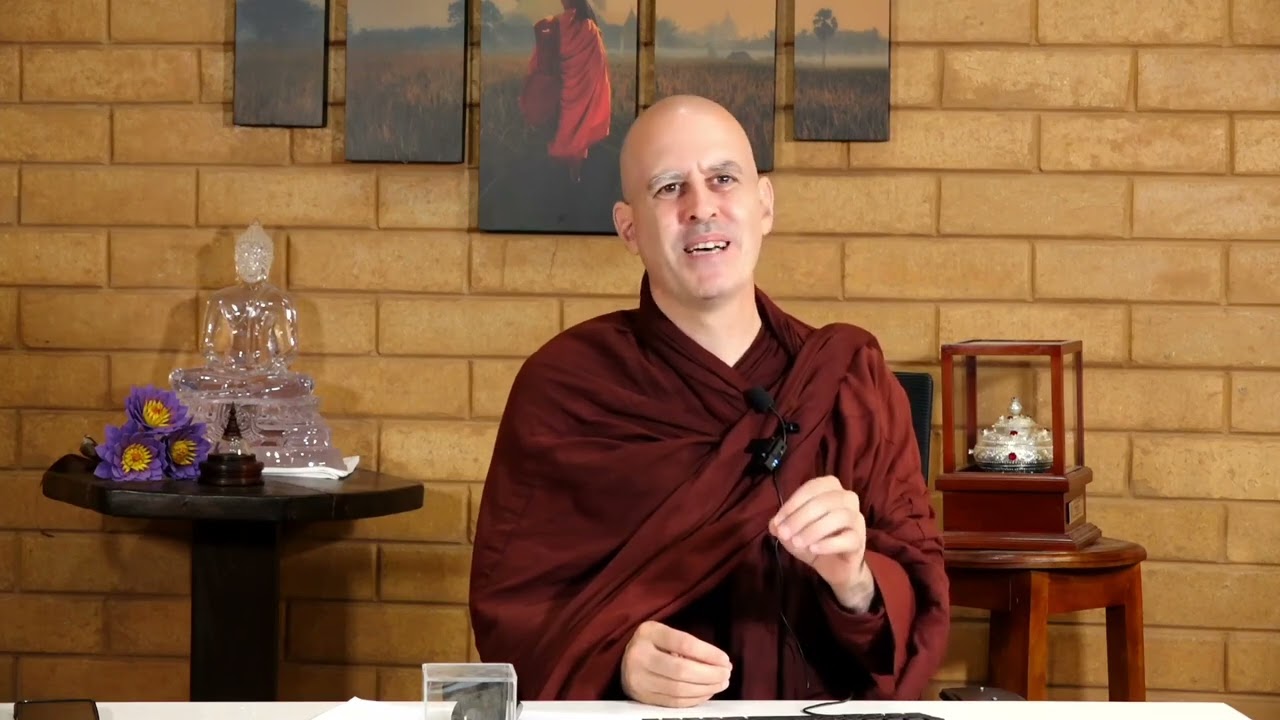Here is a word by word explanation of the Namo Tassa.
I’ve added a webpage for this teaching as well.
Introduction:
Today we will have a short and brief introduction into the meaning of “Namo Tassa Bhagavato Arahato Sammāsambuddhassa”. We will discuss the word by word meaning and the basic grammar. In short, the phrase means “Reverence to the Buddha.” Namo means reverence while the other words represent The Buddha.
Namo Tassa
Namo means Reverence. It is not a verb. It is an indeclinable noun. Nevertheless it is taken to mean “my respect” in some regards.
Tassa is built from the pronoun base “ta” and means “him”. The dative suffix “ssa” is added to “ta” to make “tassa” and should be known as “To Him”. Tassa is a reference to The Buddha in the normal pronoun sense. The special descriptor words will follow.
Bhagavato
Bhagavato has the base word of “Bhagavant” which means “The Blessed one”. It is declined in the dative case as Bhagavato and means, “To The Blessed One.” This is another word for The Buddha.
Arahato
Arahato is a similar grammatical dative form as above and has the base word of “Arahant.” It means “To The Arahant”. If the word Arahant is not familiar to you. It is often translated as “The Worthy One.” He is worthy because he has permanently removed greed hatred and delusion which are the causes for rebirth. When the arahant dies, he does not get reborn in any other plane or “nonplane” of existence. He is finished and the goal is achieved. The Buddha is also an arahant. However, non Buddha’s can eradicate these defilements as well. After death, both the Buddha and the Arahant are the same. There is no difference. Arahato, in this case, refers specifically to The Buddha.
Sammāsambuddhassa
Sammāsambuddho is the word for the Buddha that you are familiar with. He has also eradicated greed, hatred and delusion, but he has done so on his own without a teacher. He is the one who discovers the teachings. Like tassa, sammāsambuddho has a similar dative ending. Sammāsambuddha + ssa means “To The Buddha, the perfectly self enlightened one.” While some other traditions outside of Classical Theravāda say one can become a Buddha in this lifetime, they cannot and this is a wrong teaching. It takes a “modern” time equivalent of 4 big bangs in order to become a Buddha and even this might not be a long enough estimate of how long it takes. Only after one receives a prophecy from a living Buddha does one actually start the clock. It takes that long because it is not easy to become self enlightened and one needs to develop many skills over many lives to accomplish this. It should be known that the Buddha is not alive, in some other plane of existence. He is only “alive” through his teachings, like Einstein is alive through his discoveries.

Conclusion:
You can take the whole phrase to mean 4 separate sentences which refer to The Buddha and giving respect (namo) to him.
- Respect to Him
- Respect to the Blessed One
- Respect to the Arahant
- Respect to the Buddha
By knowing each word in its proper form while you say this, you can properly know what you are exactly saying. It is important and it is my hope that this can help you learn from the teachings better and a cause for you to reach Nibbāna.
Sādhu! Sādhu! Sādhu! Below is a summary poem and below that is a link to a new YouTube channel on this very topic. If you subscribe you to the YouTube channel with the bell activated, you will be informed of the new videos as soon as they are published. This channel is new and meant to cover basic terms and themes of Theravāda Buddhism. I hope you can learn from this channel in the future.
Summary Poem:
“Namo Tassa …” a stanza we expound.
“Namo” – means reverence which is also a noun,
“Tassa” means “To him,” in the dative case,
Him represents the Buddha for his reverence.
“Bhagavato” – The Blessed One, in dative in form,
“To The Blessed One”, who’s fortune is never worn.
“Arahato” to The Worthy One, as we bend further near,
“To The Arahant,” known without defilements and fear.
“Sammāsambuddho” – the perfectly self-enlightened guide,
“To The Buddha, who in wisdom he did abide.”
Four sentences, four meanings, to him we convey,
Giving respect to Him, we do in a humble way.
In understanding each word and its sacred essence,
We can seek enlightenment with a new found presence.
May this knowledge be your guide and shine well and bright,
On your path to Nibbāna may this show you the light.
The meaning of “Sammāsambuddha”
According to the Commentary and Sub Commentary:
Sammāsambuddha = Sammā + Sam + Buddha
Sammā = aviparītākarena
Sam = sayam
Buddha = sabbadhammānam buddha
(The term ‘sabbadhammānam’ is not indicated in the phrasing but is considered to be the object of the verb ‘buddha’.)
Sammā (skt. samyak) = aviparītākarena
aviparītākarena = a + viparīta + akara + ena;
a = not;
viparīta = vi + pari + i + ta (perverse/ twisted/ reversed/ contrary/ incorrect/ wrong);
ākara = way/ manner/ as;
ena = in / by / with (instrumental singular suffix);
aviparītākarena = In unperverted way/ unpervertedly/ correctly;
Sammā = unpervertedly;
Sam = sayam (Herein ‘sam’ is taken as a shortened form of ‘sayam’ and not as the general meaning);
sayam = self/ auto;
Sam = self;
Buddha = sabbadhammānam buddha;
sabbadhammānam = sabba + dhamma + ānam;
sabba = all/ every;
dhamma = thing / phenomenon;
ānam = of (possessive plural suffix);
sabbadhammānam = of everything;
buddha = realized/ enlightened;
sabbadhammānam buddha = realized of everything;
Buddha = realized of everything;
Sammāsambuddha = unpervertedly self realized of everything
(Please correct me if any English is incorrect.)
